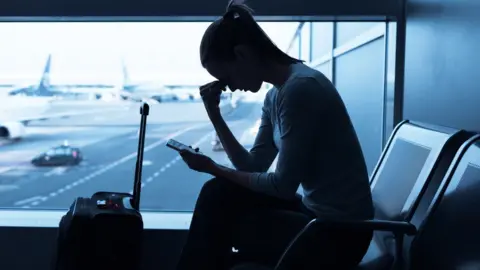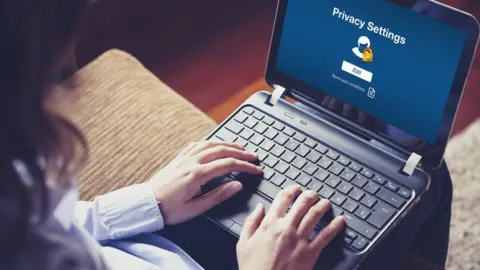#PlaneBae: A cautionary tale about privacy when a story goes viral
 kieferpix
kieferpixA woman secretly photographed on a flight to Dallas has released a statement about how she has been shamed and harassed since a fictional romance about her went viral on social media.
Parts of a conversation she had with a fellow passenger on 3 July was overheard by actress and comedian Rosey Blair and her boyfriend, who documented their interpretation of it as an unfolding romance which became known online as #PlaneBae.
But the woman says she has been hounded and doxxed - internet terminology for revealing someone's personal information without their consent.
"I did not ask for and do not seek attention. #PlaneBae is not a romance - it is a digital-age cautionary tale about privacy, identity, ethics and consent," she said in a statement given to Business Insider by her lawyer.
The original, and now edited thread was posted to Twitter and gained more than 250,000 retweets and interactions, and more than half a million likes.
However, amid the thousands of comments from those believing they were witnessing true love unfold were some who thought it was intrusive and creepy.
Allow X content?
The faces of the two passengers who had unwittingly become the subject of Rosey's story had been blurred out, but an online hunt was under way to try to identify them.
The woman was being referred to as "pretty plane girl" and Twitter users posted screen shots of what they said was her Instagram account.
"My personal information has been widely distributed online," she said in the statement.
"Strangers publicly discussed my private life based on patently false information. I have been doxxed, shamed, insulted and harassed. Voyeurs have come looking for me online and in the real world."
In stark contrast, the man in the story told the BBC he had contacted Rosey himself after being sent the thread by the wife of a friend.
"Hilarious, knew you were taking pictures," he posted in a now deleted tweet.
The story had been a viral hit. It was featured as a Twitter moment, and news organisations covered its popularity on social media.
 PeopleImages
PeopleImagesEmbracing the media attention he was receiving, he accepted invitations to appear on US television including Good Morning America, and documented his new found fame on his own Instagram stories, even changing his social media biography to describe himself as "Plane Bae".
However, criticism of the Plane Bae saga was getting louder, as social media users discussed its privacy and consent implications.
Allow X content?
Allow X content?
Another post read: "There's an assumption that everybody wants to be famous, and thus people who make other people famous are good people."
On Tuesday Rosey posted an apology to the woman on Twitter. "I apologise for taking away something I value myself quite a bit - which is sharing one's own story as means to inspire others," she wrote.
"Every woman has a right to her own story, and to have taken away yours and turned it into my own was wrong on many levels."
 Daviles
DavilesThe apology it seems is too little too late for the woman involved. The unwilling participant of the Plane Bae story has broken her silence and requested that her privacy is respected. Here is her statement in full:
"I am a young professional woman. On July 2, I took a commercial flight from New York to Dallas. Without my knowledge or consent, other passengers photographed me and recorded my conversation with a seatmate.
"They posted images and recordings to social media, and speculated unfairly about my private conduct.
"Since then, my personal information has been widely distributed online. Strangers publicly discussed my private life based on patently false information. I have been doxxed, shamed, insulted and harassed.
"Voyeurs have come looking for me online and in the real world.
"I did not ask for and do not seek attention. #PlaneBae is not a romance - it is a digital-age cautionary tale about privacy, identity, ethics and consent.
"Please continue to respect my privacy, and my desire to remain anonymous."
